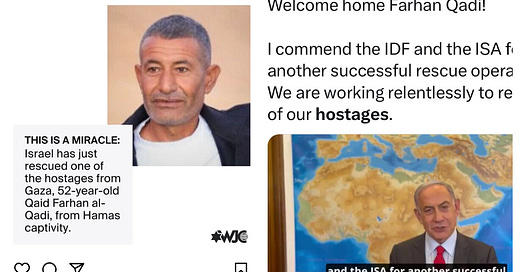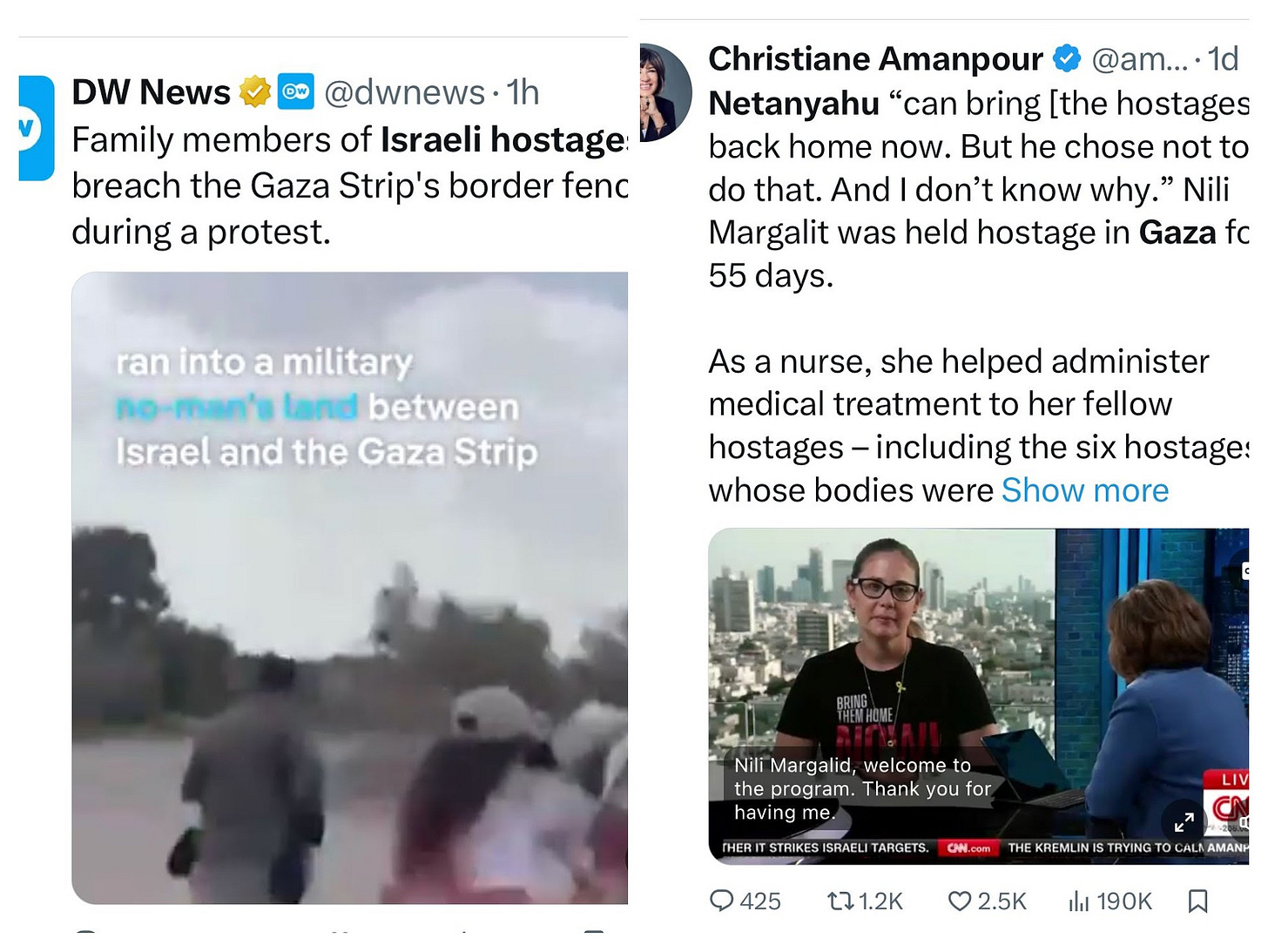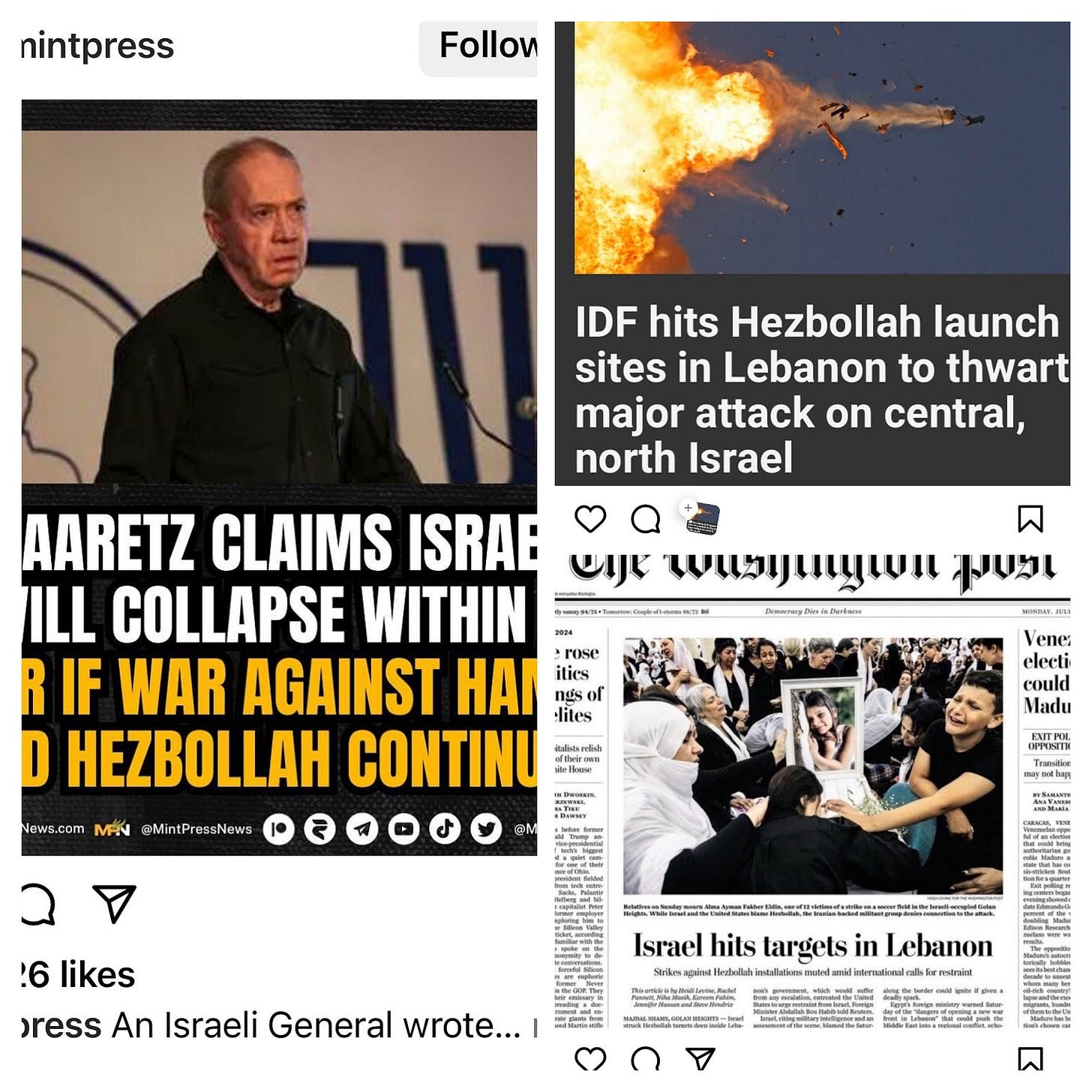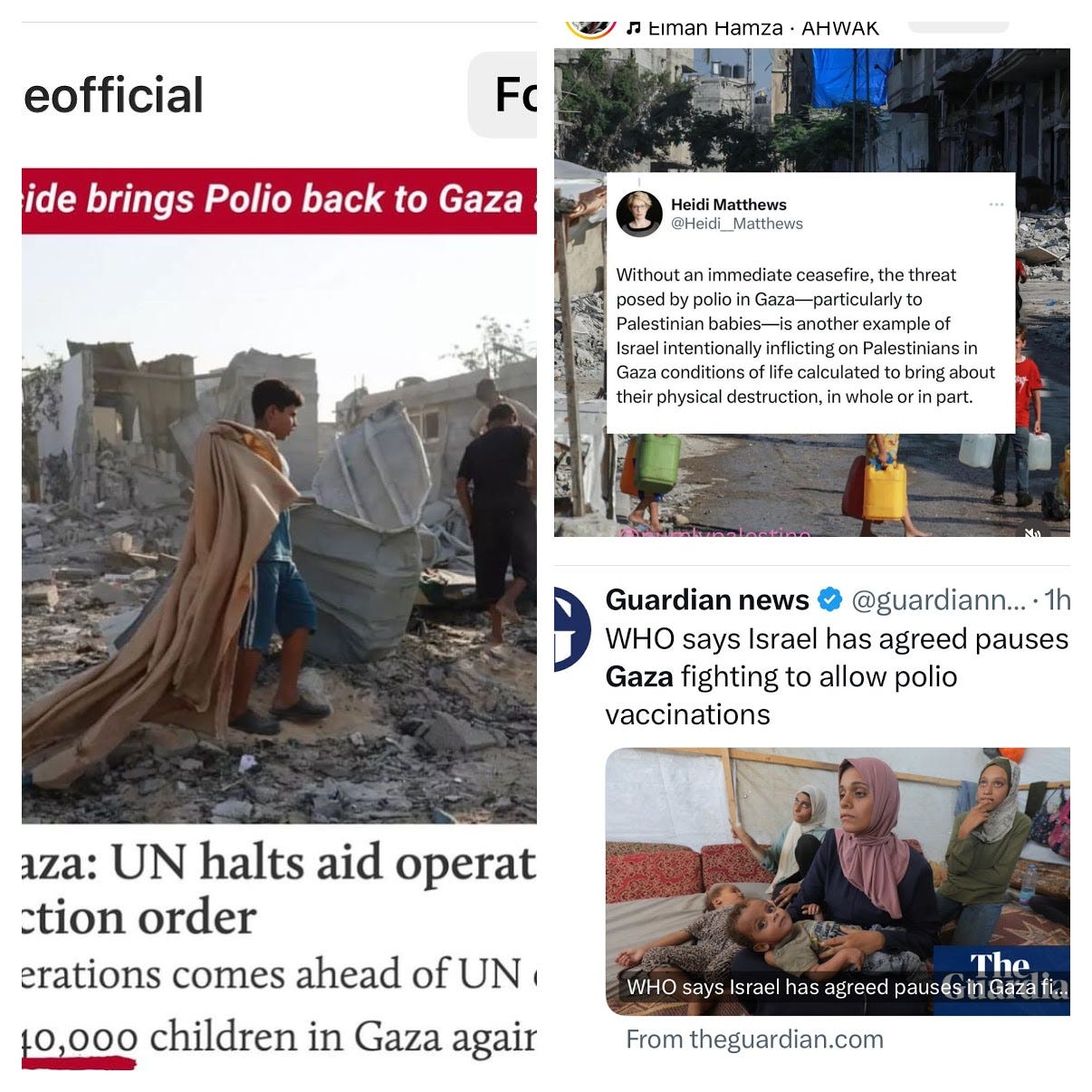Israel at War - Day 329
1. Israeli Hostage Rescued from Hamas Captivity
Kaid Farhan Elkadi, 52, resident of the Bedouin city of Rahat in the Negev, was held by Hamas in a tunnel for 326 days, since his abduction on October 7th, 2023. Elkadi managed to escape his captors and was then rescued by IDF forces operating in the area. He was taken to Soroka hospital in Be’er-Sheva, where his doctors confirmed that he was conscious and in good general condition. The IDF reported that no other hostages were found in the tunnel where Elkadi was held, nor any of their captors. Details of the escape and rescue operation are still unfolding and the IDF is yet to release information about the whereabouts of the tunnel where Elkadi was held.
The media shared moving reports of his reunion with his family, and his youngest baby boy, born shortly before he was kidnapped. The Israeli public, thirsty for good news, rejoiced in the rescue of Elkadi, and the Arab media also commented on his rescue.
In media interviews, after he was discharged from the hospital, Elkadi said that "happiness is not complete so long as there are detainees here and there…every one of them, whether Arab or Jewish, has a family waiting for them and everyone wants to be happy. I pray for an end to this." In phone conversations with PM Netanyahu and President Herzog, Elkadi urged them to sign a ceasefire/hostage deal and put an end to the suffering of the hostages. He also addressed the Israeli public, saying: "Do everything you can, protests, everything, to bring the people home."
Earlier this week, the IDF recovered the body of a soldier who was killed during the October 7th Hamas attack, and his body abducted to Gaza. At the family’s request, the IDF refrained from publishing his name.
2. A Tense Meeting Between PM Netanyahu and Released Hostages as Ceasefire/hostage deal negotiations continue
PM Netanyahu and his wife met with six hostages released from Hamas captivity in November, all of whom still have relatives held in Hamas captivity. Recordings of the meeting, published by the media, attest that the meeting was tense, as released hostages criticized Netanyahu for failing thus far to secure a ceasefire/hostage release deal with Hamas. In the recording, Netanyahu is heard saying “What deal?”, as he pushes back on claims from released hostages that he has torpedoed previous opportunities to seal a deal. One of the women who attended the meeting, whose father is still held hostage, said she "left with a bad feeling that [the deal] is not going to happen soon."
Recordings and quotes from the meeting leaked to the media sparked public criticism that PM Netanyahu was insensitive to the plight of the released hostages and relatives. In one incident, a former hostage whose relatives are still held hostage said: “I don’t want humanitarian aid to get to them, I want the hostages here!”, to which Netanyahu responded: “There are many things we want and they’re hard to get, for example, I’d like to walk to Italy on foot in a straight line… so if that’s what we need to do it means drying up the ocean, so ‘let’s dry up the ocean, what’s the problem”? In another incident, in response to a former hostage who told him she was beaten and tortured by her captors, Netanyahu responded that he was once beaten as a soldier in captivity training and that it was painful, although he knew that he wasn’t in real danger because it was a drill.
Sarah, wife of PM Netanyahu, was also present at the meeting. In the recordings she is heard defending her husband and claiming that the military is to blame for October 7th, and that the PM couldn’t have known of the attack ahead of time, since he was not informed. She also complained that she is constantly slandered since she became wife of the PM.
Negotiations for a ceasefire/hostage deal continue. Earlier this week, an Israeli lower level delegation of officials from the Mossad, Shin Bet and the IDF left for further talks with the mediators in Qatar, who are working on a new proposal, addressing key issues. The aim of the talks is to narrow the gaps regarding security arrangements along the Netzarim corridor, the presence of Israeli forces along the Philadelphi corridor and the entities that will take charge for manning the Rafah border crossing. A source involved in the negotiations told the media that "unless there is some flexibility on these issues, it is doubtful that we will be able to secure the release of the hostages."
A convoy of hostage families and their supporters arrived at the Gaza border, where they breached the border fence. Family members conveyed messages to their loved ones still held in Hamas captivity, projected through loudspeakers facing Gaza, vowing that they will continue to do everything within their power to bring them back home.
3. Israel Intensifies Military Operations in the West Bank, Head of Shin Bet Warns of Growing Violence from Jewish Settlers Against Palestinians
The Israel Defense Force (IDF) intensified its military operations in the northern West Bank earlier this week, in another attempt to destroy what they define as terrorist Palestinian infrastructure. Palestinians are killed daily by the IDF who describe the dead as terrorists.
Meanwhile Jewish settlers, most of whom live in what are considered illegal outposts under both Israeli and international law, continue to intensify their hostile operations against Palestinian communities throughout the West Bank. Earlier this week there was another incident in which a group of masked Jewish settlers entered a Palestinian community, set fires, terrorized people, and in general created chaos and fear among the local inhabitants. As they are masked, act in remote areas, and the police force in the area is weak and ineffective, they are not caught and never held accountable and put on trial.
The head of the Shin Bet, Ronen Bar, issued a statement in which he warned of the growing number and severity of hostile settler activities. He stated that the police force is not functioning. He further defined those activities as Jewish terrorism and warned that if they are not treated firmly, the situation will explode. He also noted that the police force is not effective at all. In response, Minister of National Security, Itamar Ben-Gvir, who is in charge of the police, published an ad in major newspapers stating that Bar failed on October 7th, and that he shouldn’t be responsible for a hostage deal. Unfortunately PM Netanyahu did not respond to the direct provocation from Ben Gvir, who constantly smears senior officials.
4. Israel Prevented a High Scale Wide Ranging Missile Attack from Lebanon
Early Sunday morning the Israeli air force (IAF) attacked targets in southern Lebanon to prevent a planned large scale missile attack by Hizbollah towards a wide range of targets inside Israel. Israeli intelligence discovered that Hizbollah was preparing a for sizable operation and launched a preventive attack. The preemptive army operation placed the majority of the country under an escalated emergency situation which was lifted shortly after the IAF operation ended.
Weeks ago, Hizbollah promised to take revenge for the targeted killing of its Chief of Staff by a military operation that Israeli took full responsibility for. The planned revenge did not happen right after the assassination and it was expected by some intelligent experts that it would be coordinated with Iran, which is the main sponsor of Hizbollah and it has own wish to take revenge for the targeted killing of a senior Hamas policy maker in Tehran. This assassination is attributed to Israel, although Israel never admitted to and did not take responsibility for the killing.
The American administration has tried its best to prevent the revenge actions out of fear that it will escalate to a full scale regional war. Hizbollah intended, according to its announcements, to target Israeli army bases, including the main operational and training base for Israels largest intelligence army unit, 8200. Iran has not as yet acted, and it is still unknown if and when it will take revenge.
Meanwhile, Hizbollah continues to operate in northern Israel and has managed to destroy more and more houses and extend the range of missile shelling. Tens of thousands of Israelis are still evacuated from their homes, staying in hotels and temporary homes. Many local mayors believe that this ongoing situation can be solved only if Israel launches a full-scale war in Lebanon and forces Hizbollah to come to a ceasefire deal.
5. IDF Agrees to Humanitarian Pauses to Allow Polio Vaccination Drive in Gaza
Considering growing concern vis-à-vis the eruption of polio in Gaza and the imminent threat it poses to the health of Gaza civilains, especially babies and chiildren, the EU's member states called for humanitarian pauses in the Israel-Hamas war to allow a childrens vaccination campaign. According to Israeli and international media, a senior World Health Organization (WHO) official said that the IDF has given the organization a "preliminary commitment for area-specific humanitarian pauses" during a polio vaccination campaign. According to WHO representative in the Palestinian territories, the humanitarian pauses will last three days in different areas of the Gaza Strip, beginning in central Gaza in the coming days.
Earlier this week the UN food agency, WFG, announced that it has paused humanitarian aid operations and the movement of its staff in the Gaza Strip after two of the organization’s armoured vehicles ascorting aid lorries came under IDF fire.










